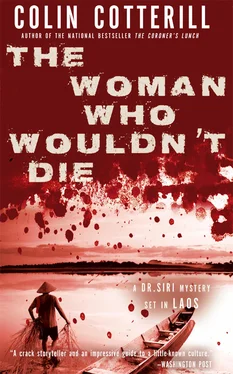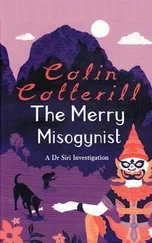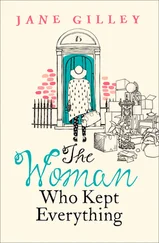Colin Cotterill - The Woman Who Wouldn't die
Здесь есть возможность читать онлайн «Colin Cotterill - The Woman Who Wouldn't die» весь текст электронной книги совершенно бесплатно (целиком полную версию без сокращений). В некоторых случаях можно слушать аудио, скачать через торрент в формате fb2 и присутствует краткое содержание. Жанр: Триллер, на английском языке. Описание произведения, (предисловие) а так же отзывы посетителей доступны на портале библиотеки ЛибКат.
- Название:The Woman Who Wouldn't die
- Автор:
- Жанр:
- Год:неизвестен
- ISBN:нет данных
- Рейтинг книги:3 / 5. Голосов: 1
-
Избранное:Добавить в избранное
- Отзывы:
-
Ваша оценка:
- 60
- 1
- 2
- 3
- 4
- 5
The Woman Who Wouldn't die: краткое содержание, описание и аннотация
Предлагаем к чтению аннотацию, описание, краткое содержание или предисловие (зависит от того, что написал сам автор книги «The Woman Who Wouldn't die»). Если вы не нашли необходимую информацию о книге — напишите в комментариях, мы постараемся отыскать её.
The Woman Who Wouldn't die — читать онлайн бесплатно полную книгу (весь текст) целиком
Ниже представлен текст книги, разбитый по страницам. Система сохранения места последней прочитанной страницы, позволяет с удобством читать онлайн бесплатно книгу «The Woman Who Wouldn't die», без необходимости каждый раз заново искать на чём Вы остановились. Поставьте закладку, и сможете в любой момент перейти на страницу, на которой закончили чтение.
Интервал:
Закладка:
‘You’ll notice I didn’t lie this time,’ said Siri.
‘I’m impressed. I find honesty in a man very erotic.’
As if by magic, their pace quickened.
4
I was two months short of my fourteenth birthday when I killed my first Frenchman .
‘Do you think it’s all right to start like that?’
‘It’s your story. Start any way you like.’
‘I don’t want to sound racist.’
‘You could qualify it.’
I was two months short of my fourteenth birthday when I killed my first Frenchman .
At the time it didn’t matter that he was French, or European, or even a man for that matter. I killed him because he was evil. Because I had no choice. It was several more years before I developed a penchant for killing men just because they were French .
‘That might be considered just a tad …’
‘I’ll cut it out later.’
There were those who said I’d been driven to it by the Fates. I was born in December 1911, slap in the middle of the Chinese revolution. My grandfather named me Daeng to mark the event. Daeng is usually a nickname but he told everyone his granddaughter of the revolution would be known to everyone as Red. The bamboo hut in which I first opened my eyes was in a minority Lao Teung village in Savanaketh Province. Ours was a district famous for a three year uprising against French taxes. Very few of our men lived to boast of their bravery. My father had been one of the unlucky ones .
I was born into a country called Laos that had already spent a quarter of a century as a jewel in the French colonial crown — a crown that included the three provinces of Vietnam, Cambodia, and us. We were a small, particularly dull jewel. Our French lords described us as The least urgent souls on earth with a thousand obstacles and superstitions to interfere with the accomplishment of work. Their profits from Laos never amounted to more than one per cent of their total revenue from Indochina. We were a terrible disappointment. In fact we weren’t even a country before the French came along, just a hotchpotch of diffuse tribes stirred together to make the paperwork easier. As I grew up in my mother’s house it seemed like the most natural thing in the world that the pale-skinned, easily sunburned gods should be our masters and mistresses. Like the deaths of newborn babies from preventable diseases and the enslavement of our healthy men, that was just the way of it. It was our penance for being a country too stupid to administer itself. Too lazy to work. Too indifferent to rebel. How fortunate we were that the masters recognized our inadequacies early. They shipped in Vietnamese labourers to build, farmers to work our land, and administrators to keep us in our place. None of the clerks or the section heads at our regional government office spoke Lao. Vietnamese and French were the languages of administration .
Of course, to learn French it would have helped to have gone to school. There was one down in the town. But it was exclusively for the children of the gods and the sons of the wealthy Vietnamese. So, we Lao of little ability struggled as best we could, picked up words here and there and kept our fingers crossed that we didn’t get ill. There was a small regional hospital but that too was reserved for the service of the French and Vietnamese. Growing up in my small Lao Teung village, this was my normal .
‘Siri. I wasn’t expecting to see you again so soon,’ said Seksan. ‘Madame Daeng not with you?’
‘Her head’s giving her some trouble. In fact she can’t find it.’
Seksan laughed. He had an infectious giggle.
‘I’m afraid we hit the bottles a little too hard last night,’ he said, opening the embassy gate to let his friend in. ‘In fact, I’m surprised to see you up so early. What can I do for you?’
‘I was wondering whether I could take a quick peek at the embassy’s top secret files.’
Seksan laughed again but noticed that Siri wasn’t smiling.
‘You’re serious.’
‘Yes.’
‘You’re asking me whether I’d allow an ex-member of the Lao Issara, a sworn enemy of the French colonists, who proceeded to wage war against my adopted country for twenty years, to thumb through the embassy’s secret files?’
‘Yes.’
‘You do realize there are several legal and diplomatic arguments as to why I probably shouldn’t allow it?’
‘Well,’ said Siri. ‘If they’d made you ambassador I’d listen to those arguments. But they gave you a broom and a toilet brush and told you to keep the place clean. Right now this is just a sprawling compound of quaint little buildings with no diplomatic status at all. I’m betting the staff didn’t bother to take anything with them because they’re expecting us to beg them to come back any time soon. I mean, if they left the wine …’
Seksan smiled at him.
‘There’s a store building full of files,’ he said.
‘There you go.’
‘I have orders to set light to it if the compound is taken over.’
‘If they’re prepared to burn them, they can’t be worth that much, can they now? Give me an hour.’
‘I might come and have a look for myself.’
In its heyday, the two-tier C’est La Vie had plied between Vientiane and Luang Prabang during the high-river months, taking joyful French families and off-duty squaddies on an exotic Mekhong River cruise, a highlight of their time in Indochina. Until the river started to attract snipers, the C’est La Vie , now renamed King Burom , did the same trip with Americans, who, you may recall, were technically not in Laos at all. They would hire the good old King and escort their ‘girlfriends’ and crates of bourbon on romantic overnight cruises. Take photographs of one another’s backsides and throw up over the side. Good for the fish, they said. But now the old girl had lost that international romance. There were so many layers of paint on her she’d become amorphous. Under the Party moniker of Voyage of Harmony , she chugged up and down the river picking up chickens in rattan cages and trussed pigs and burlap sacks of dried manure. And every now and then she’d take a passenger, the few whose laissez-passers were in order. And then there’d be someone for the old river pilot to converse with on the eighteen-hour journey from the new capital to the old.
Rather than sit cross-legged on the splintery deck, Siri, Daeng and Mr Geung had brought their own folding chairs. They’d even been thoughtful enough to bring along a fourth for Comrade Civilai. He was on his way to Luang Prabang on one of his many post-retirement functions. He’d refused the helicopter ride, arguing that his haemorrhoids acted up at altitude. Instead he would leave a day early and enjoy a leisurely cruise with his best friends. He liked to grumble about the assignments they gave him here and there yet, to be honest, that feeling of being needed was a drug. But, of late, this cooperative bunkum was getting him down. He’d sit for hours in meetings with sensible farmers trying to convince them that socialism would make them all equally wealthy. And he’d wait for that old-timer to put up his hand and ask, ‘And will the system share the poverty just as fairly?’ Civilai wanted to shout ‘Yes.’ The floods and the droughts would distribute misery evenly to all the co-op members. And the politburo would sit back and scratch its head and come up with a new system for next year.
Civilai’s enthusiasm for the doctrine he believed in had won hearts in those early years. He was a communicator. He was a faithful party member. And then he got old and one day over breakfast — it was eggs lightly fried in soy sauce with a sprinkling of grated onion, he remembered quite clearly — he’d looked up from his plate and said to his wife, ‘It isn’t working.’
Читать дальшеИнтервал:
Закладка:
Похожие книги на «The Woman Who Wouldn't die»
Представляем Вашему вниманию похожие книги на «The Woman Who Wouldn't die» списком для выбора. Мы отобрали схожую по названию и смыслу литературу в надежде предоставить читателям больше вариантов отыскать новые, интересные, ещё непрочитанные произведения.
Обсуждение, отзывы о книге «The Woman Who Wouldn't die» и просто собственные мнения читателей. Оставьте ваши комментарии, напишите, что Вы думаете о произведении, его смысле или главных героях. Укажите что конкретно понравилось, а что нет, и почему Вы так считаете.












